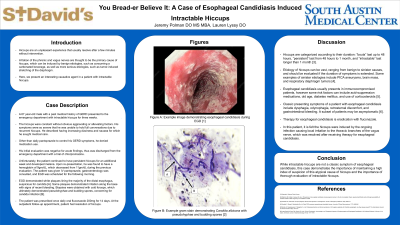Sunday Poster Session
Category: Esophagus
P0467 - You Bread-er Believe It: A Case of Esophageal Candidiasis Induced Intractable Hiccups
Sunday, October 22, 2023
3:30 PM - 7:00 PM PT
Location: Exhibit Hall

Has Audio

Jeremy Polman, DO, MS, MBA
St. David's South Austin Medical Center
New York, NY
Presenting Author(s)
Jeremy Polman, DO, MS, MBA1, Lauren Lyssy, DO2
1St. David's South Austin Medical Center, Nashville, TN; 2St. David's South Austin Medical Center, Austin, TX
Introduction: Hiccups are an unpleasant experience that usually resolve after a few minutes without intervention. Irritation of the phrenic and vagus nerves are thought to be the primary cause of hiccups, which can be induced by benign etiologies, such as consuming a carbonated beverage, as well as more serious etiologies, such as tumor-induced stretching of the diaphragm. Here, the authors present an interesting causative agent in a patient with intractable hiccups.
Case Description/Methods: A 67 year-old male with a past medical history of GERD presented to the emergency department with intractable hiccups. The patient described developing hiccups three weeks prior to presentation. The hiccups were constant without obvious aggravating or alleviating factors. His symptoms were so severe that he was unable to hold full conversations due to recurrent hiccups. He described having increasing dizziness and nausea for which he sought medical care. Other than daily pantoprazole to control his GERD symptoms, he denied medication use. His initial evaluation was negative for acute findings, thus he was discharged from the emergency department with a trial of chlorpromazine. Unfortunately, the patient continued to have persistent hiccups for an additional week and developed melena. Upon re-presentation, he was found to have a hemoglobin of 9gm/dL, which was 11gm/dL during the previous evaluation. The patient was given IV pantoprazole, gastroenterology was consulted, and EGD was scheduled for the following morning. EGD demonstrated white plaques lining the majority of the distal esophagus, suspicious for candida. Some plaques demonstrated irritation along the base with signs of recent bleeding. Biopsies were obtained with cold forceps, which ultimately demonstrated pseudohyphae and budding spores, concerning for candida infection. The patient was prescribed once daily fluconazole 200mg for 14 days. At the outpatient follow-up appointment, patient had resolution in hiccups.
Discussion: In this patient, it is felt that the hiccups were induced by local irritation of the esophagus from the candida plaques, which ultimately led to irritation of the vagus nerve and stimulation of a hiccup reflex. While intractable hiccups are not a classic symptom of esophageal candidiasis, this case demonstrates the importance of maintaining a high index of suspicion of this atypical cause of hiccups.
Disclosures:
Jeremy Polman, DO, MS, MBA1, Lauren Lyssy, DO2. P0467 - You Bread-er Believe It: A Case of Esophageal Candidiasis Induced Intractable Hiccups, ACG 2023 Annual Scientific Meeting Abstracts. Vancouver, BC, Canada: American College of Gastroenterology.
1St. David's South Austin Medical Center, Nashville, TN; 2St. David's South Austin Medical Center, Austin, TX
Introduction: Hiccups are an unpleasant experience that usually resolve after a few minutes without intervention. Irritation of the phrenic and vagus nerves are thought to be the primary cause of hiccups, which can be induced by benign etiologies, such as consuming a carbonated beverage, as well as more serious etiologies, such as tumor-induced stretching of the diaphragm. Here, the authors present an interesting causative agent in a patient with intractable hiccups.
Case Description/Methods: A 67 year-old male with a past medical history of GERD presented to the emergency department with intractable hiccups. The patient described developing hiccups three weeks prior to presentation. The hiccups were constant without obvious aggravating or alleviating factors. His symptoms were so severe that he was unable to hold full conversations due to recurrent hiccups. He described having increasing dizziness and nausea for which he sought medical care. Other than daily pantoprazole to control his GERD symptoms, he denied medication use. His initial evaluation was negative for acute findings, thus he was discharged from the emergency department with a trial of chlorpromazine. Unfortunately, the patient continued to have persistent hiccups for an additional week and developed melena. Upon re-presentation, he was found to have a hemoglobin of 9gm/dL, which was 11gm/dL during the previous evaluation. The patient was given IV pantoprazole, gastroenterology was consulted, and EGD was scheduled for the following morning. EGD demonstrated white plaques lining the majority of the distal esophagus, suspicious for candida. Some plaques demonstrated irritation along the base with signs of recent bleeding. Biopsies were obtained with cold forceps, which ultimately demonstrated pseudohyphae and budding spores, concerning for candida infection. The patient was prescribed once daily fluconazole 200mg for 14 days. At the outpatient follow-up appointment, patient had resolution in hiccups.
Discussion: In this patient, it is felt that the hiccups were induced by local irritation of the esophagus from the candida plaques, which ultimately led to irritation of the vagus nerve and stimulation of a hiccup reflex. While intractable hiccups are not a classic symptom of esophageal candidiasis, this case demonstrates the importance of maintaining a high index of suspicion of this atypical cause of hiccups.
Disclosures:
Jeremy Polman indicated no relevant financial relationships.
Lauren Lyssy indicated no relevant financial relationships.
Jeremy Polman, DO, MS, MBA1, Lauren Lyssy, DO2. P0467 - You Bread-er Believe It: A Case of Esophageal Candidiasis Induced Intractable Hiccups, ACG 2023 Annual Scientific Meeting Abstracts. Vancouver, BC, Canada: American College of Gastroenterology.
